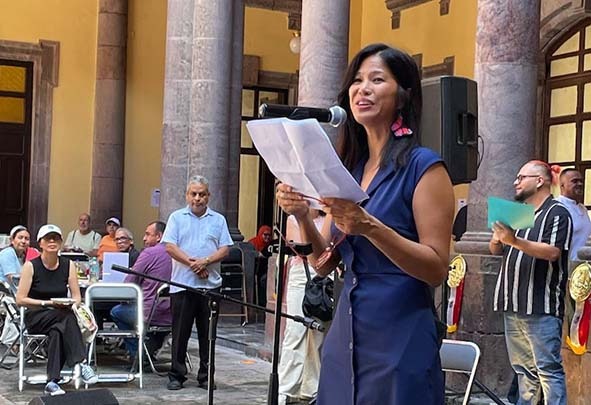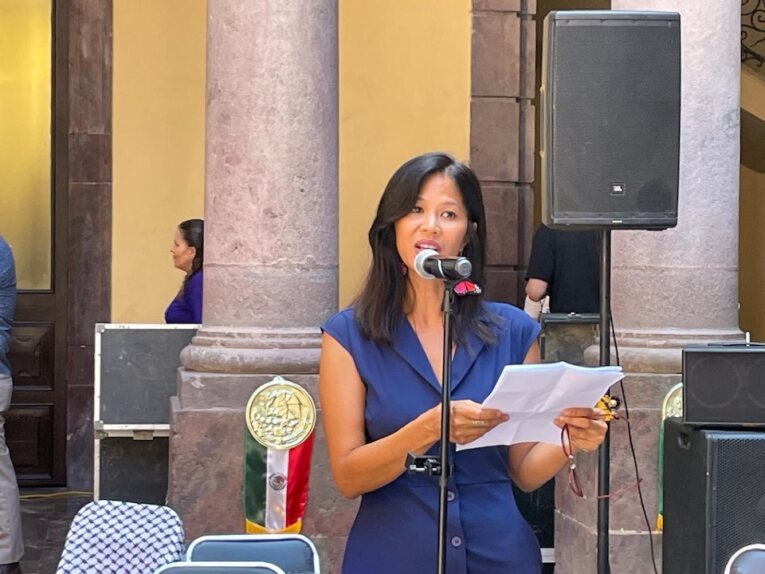When Tran Dang is asked why her nonprofit is called The Rhizome Center for Migrants, she doesn’t hesitate.
“Rhizomes sprout more roots and more shoots in unexpected ways. A rhizome symbolizes growth that has no origin or end. It represents, for us, resilience across borders and interconnected journeys.”
For Tran, founder and director of The Rhizome Center for Migrants, the rhizome is the perfect metaphor for the people she serves: people returned and deported who must navigate complex realities of life in Mexico after being uprooted from the United States. Like rhizomes, they survive by adapting, surviving, and forming networks in nonlinear ways.
Tran shared her story on Sept. 17 at the American Society of Jalisco (AmSoc), offering a glimpse into the challenges deportees face and the fragile but resilient networks that sustain them.
Leer esta historia en Español AQUÍ

From Refugee Daughter to Founder
Tran’s passion for migrant rights is personal. Her parents came to the U.S. as students before the end of the Vietnam War. When the war ended, their visas were converted to refugee status.
Growing up as the daughter of Vietnamese refugees in the United States, she saw firsthand the toll of separation. “I remember when my mother saw my grandmother again for the first time after 30 years. I remember what that reunion was like and what it meant to be able to grow up in the United States with my aunts, uncles, and cousins, and what it was like for them to start over,” she recalled. That experience of forced displacement and integration became the seed for her later work.
By the time she moved to Mexico in 2016, the Trump administration’s deportation machine was in full force. Living in Guadalajara, she couldn’t ignore what was happening around her. So Tran, a human rights attorney focused on migrant and refugee rights decided to found The Rhizome Center in this context as a way to lend a hand.
One Woman, One Staff, Thousands of Lives
Today, Rhizome is a registered U.S. nonprofit. But in practical terms, it’s Tran, who has built a support network here in Guadalajara, as well as throughout Mexico and the United States to ensure that the Rhizome Center can respond to the most urgent needs.
“There is currently one employee in The Rhizome Center but we are growing and we have so much community support.”
Besides being an attorney by training, Tran comes from a business background. She draws on her background in law, business, and communications to manage everything from legal cases to community outreach. With only volunteers and partnerships to back her, Tran juggles legal aid, advocacy, crisis response, community events, fundraising, and even the organization’s website and graphics. But she is quick to stress that the real burden falls on the people she serves.
“When you are deported to a harsh place, everything is against you. You’re up against the Mexican government. You’re up against the U.S. government. No one cares. No one understands. And you have no home.
“People’s lives are at stake. And I want people who come to me to understand that I understand their urgency, and I will match it.”
Deported Veterans and Forgotten Citizens
One of Rhizome’s most urgent areas of work is bringing back deported veterans. When the audience expressed shock, Tran confirmed the disconcerting news:
“Yes, the U.S. deports its veterans. They deport refugees, they deport adoptees, they deport U.S. citizens, anyone you can think of.”
Tran recounted the case of U.S. Army veteran Jose Tinajero, who she met here in Guadalajara and who, at the time, had been deported for 25 years. Tran took his case and succeeded in bringing him home.
“We were able to get him back to the United States. We were able to get him to his citizenship interview. He qualified for citizenship based on his service but he never had an attorney to help him navigate his way back. Today he is a U.S. citizen living in the state of Washington studying his MBA in his mid-60s.”
The Rhizome Center is part of the Deported Veterans Coalition, pressing for policy change while also handling individual cases. It’s painstaking work: reopening green card cases, filing pardon applications, and even securing humanitarian parole for family reunifications. “Every case I take is a case that has already been lost.”
The Human Cost of a ‘Two-Second Hug’
Tran also described the Mexican government’s official deportee program, called México te Abraza — “Mexico embraces you,” as far from adequate.
“I call it the two-second hug,” she said.
She explained why: deportees may receive a brief shelter stay, a temporary ID credential, and a 2,000-peso debit card, but little else. Within 72 hours, they’re expected to leave and start a new life, often with no documents, no job, and nowhere to go.
Some end up homeless in city parks. Others live with relatives who don’t have time to take them from government office to government office. Many U.S.-born children of deportees, she noted, encounter their own challenges upon arrival and grow up undocumented in Mexico, unable to attend school or access healthcare.
“There are some 287,000 U.S. minors in Mexico who don’t have the proper documentation to legalize here in Mexico.”
For many families, The Rhizome Center has become a vital bridge to documents, services, and stability.

Building Belonging Through Culture
Beyond legal aid and crisis response, Tran sees narrative and culture as tools for healing.
The Rhizome Center organizes essay contests for U.S.-born kids, photo exhibits on belonging, and public festivals. The annual Chicano Fest — started by a deported community leader and event that The Rhizome Center helps to organize— has become a vibrant cultural gathering. And every September, Rhizome hosts its Migrants Day Festival. This year’s festival will feature more than 30 migrant and refugee artists, musicians, artisans, and cooks.
These events, Tran said, create spaces “where people who have been deported and others who have experienced migration can connect to their identities as well as others who are on a similar journey.”
Following the Need
When asked why she chose to dedicate her work to Mexican deportees, she responded,
“As a child of Vietnamese refugees who experienced family separation and forced displacement, and as an American living in Mexico, it was not a leap for me to care about others who have been uprooted and are now far away from home.”
Here in Guadalajara, she has built a network that reflects the rhizome itself: interconnected, resilient, and always sprouting new shoots.
A Human Response
Ultimately, Tran believes the work comes down to compassion. She shared how people she sees often tell her she is the first to simply acknowledge their pain.
“The thing I keep hearing is, ‘You’re the first person to say, I’m sorry for what you’re going through.’ When we live in a world that is less and less human, you have to be more and more human. Those small gestures mean so much.”
Like the rhizome itself, The Rhizome Center grows by extending roots into unexpected places — connecting deported people to resources, community, and dignity across borders.
Tran closed her talk with a simple invitation: “Spread the word. Volunteer. Donate. Let other folks know that The Rhizome Center is a resource.”
Follow The Rhizome Center on Instagram at @therhizomecenter; or reach out to the organization by WhatsApp at +52 33 2182 0836.
This story was originally published at The Guadalajara Reporter and is shared here with permission,
American Society of Jalisco migration Rhizome Center Tran Dang
Oh I love this article so much! Such important work, and so inspiring.
Thank you, Toni! Yes, Tran is an inspiration, to be sure!
I loved the metaphor of the rhizome — that underground, interconnected root system that grows unpredictably, sending up new shoots wherever conditions allow. Tran Dang uses it beautifully to describe how deportees must keep putting down roots in new places even when everything feels fractured.
Her own story is powerful: daughter of Vietnamese refugees, raised in the U.S., then relocating to Mexico to help people who have been forcibly uprooted. That personal connection gives her work grit and empathy — you feel she isn’t helping from a distance, she knows what it’s like to live between worlds.
The stories she shares are sobering: deported veterans languishing overseas, people dropped into Mexico with “two-second” embrace programs that barely give them a footing, U.S. children born abroad who struggle for documentation, and families separated by policy and geography. ([turn0view0]) Each case is a reminder that “deportation” is not just a legal act — it’s a rupture of identity, access, and community.
What I find especially compelling is how the Rhizome Center doesn’t just provide legal aid — it leans into culture, narrative, and community. Festivals, essays, public gatherings — these bridges help people not only survive, but remember who they are beyond their status.